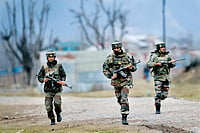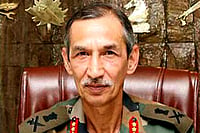Internal conflicts are challenging for all countries, but most of all for democracies because the fight is not only for victory over the insurgents, but to do so while preserving democratic values. And the primary democratic value is protection of the human rights of innocent civilians caught up in the battle zone.
Since Independence, India has been fighting insurgencies, from the Northeast states to the Maoist heartland, Punjab, and Jammu and Kashmir. Among these conflicts, Jammu and Kashmir remains the most troubled and the most visible. In scrutinising the government’s human rights record in Kashmir, attention is primarily directed at the uniformed forces that are in the lead in carrying out operations against insurgents or terrorists. The Indian Army is often accused of paying only lip service to human rights. The Armed Forces (Special Powers) Act (AFSPA), which enables the army to operate in internal security duties, has been described as an abomination—a draconian law under which the army carries out human rights violations with impunity.
ALSO READ: Our Wronged Rights
On the other hand, the army claims that it has a policy of ‘zero tolerance for human rights violations’. The Indian Army’s Northern Command, responsible for operations in Jammu and Kashmir, has the following on its official website:
“If one dispassionately analyses the track record of armies worldwide as regards adherence to human rights, then it becomes amply clear that the Indian Army undoubtedly has a finest track record as a sentinel for preserving human rights. No other country in the Combat Zone to include US, Pakistan, Sri Lanka, Russia etc faced with an insurgency of such a magnitude have restrained themselves from using escalatory modes of combat, including helicopter gunships, artillery, unmanned drones, tanks etc to quell insurgents/terrorists. Indian Army has in comparison been shouldering the burden uncomplainingly of ensuring that all its actions are done in ‘good faith’ and taking in its stride adverse public/media criticism of even minor aberration or occasional collateral damage.”
ALSO READ: Mind The Gap
Among these contrasting positions, a question that is often asked is whether the army can meet the demands of national security while also respecting human rights and minimising civilian suffering. To answer this question, we must explore the laws and principles under which the army carries out counterinsurgency/counterterrorism operations. I will look at two of the most debated aspects—AFSPA and the army’s approach in tackling internal conflicts—and analyse whether any changes in these are necessary.
Let me first examine the controversial AFSPA. When the government tasks soldiers for internal security duties, there must be a legal mandate for them to operate within the country. A short-term deployment for controlling civil disturbances is normally carried out under the provisions of the Code of Criminal Procedure, but to cover extended operations requiring the heavy presence of the army, AFSPA was enacted. Without the cover of AFSPA, the army will have to cease all operations in Jammu and Kashmir, Manipur and Nagaland.
ALSO READ: Floydian Slip
While a law is essential, the existing AFSPA appears to have lost much of its credibility and utility. Section 4, which empowers officers to “fire upon or otherwise use force, even to the causing of death”, is criticised for providing sanction to soldiers for excessive use of force that is in contravention to international norms. Section 6, which prohibits prosecution or other legal proceedings without the sanction of the central government, is said to give blanket immunity to soldiers to violate human rights.

In areas where AFSPA is in force, the local population is entirely against it. Wilhelm Joseph Schelling, a 19th-century philosopher, observed, “The more people feel there is injustice, the more it becomes part of their psyche.” AFSPA has become a rallying cry for human rights activists as an example of oppression—of non-accountability and immunity of soldiers from prosecution, even in serious cases. Much of the criticism that India faces nationally and internationally is related to AFSPA.
ALSO READ: Nailed To The Cross, Ripe For Rescue
Supporters of AFSPA claim that the law is essential to prevent legal harassment of soldiers who are putting their lives at risk while battling terrorism in the country. Such protection is undoubtedly required, but it is becoming increasingly doubtful if AFSPA can provide this. Numerous Supreme Court rulings, in particular the judgment of July 2016, have taken away much of the so-called protection to army soldiers.
In its July 2016 judgment, the Supreme Court observed that “even if the armed forces decide to take action and inquire into the allegations at their own level, it would not preclude any other inquiry or investigation into the allegations made”. The court also ruled that “in the event of an offence having been committed by any person…through the use of excessive force or retaliatory force, resulting in the death of any person, the proceedings in respect thereof can be instituted in a criminal court subject to the appropriate procedure being followed”.
ALSO READ: In Our Roots Are Our Rights
In September 2018, around 700 officers approached the Supreme Court against what they considered the dilution of the provision of AFSPA regarding protection from prosecution without the Centre’s approval. This unprecedented action by a large number of officers shows that there are genuine concerns in the army about criminal prosecution even while carrying out bona fide duties. This could have a serious effect on the morale of soldiers engaged in counterterrorist actions.
In light of this, it is perhaps a time for the government to consider bringing in a new law to replace the AFSPA. A law that addresses some of the harsher provisions of AFSPA and is in line with human rights principles. At the same time, it must also mitigate the concerns of soldiers and ensure that the extraordinary situation under which they are operating is recognised and adequate legal protection is provided against false and exaggerated allegations. In my view, a sensibly drafted new law will only strengthen India’s commitment to human rights without impacting the necessary operational freedom of the army.
ALSO READ: Of Rage, Courage And Democracy
Let me now turn to the army’s doctrinal thinking and its conduct on the ground. The army’s doctrine reflects an understanding that in population-centric conflicts like Kashmir, Manipur and Nagaland, the support of the local population is crucial to finding a resolution. In the fight between the army and terrorists, the latter terrorises, while the former provides a blanket of security to civilians caught in the conflict. Officers and soldiers operating on the ground clearly recognise that operating with impunity and abusing human rights is utterly counter-productive to success. If the population turns against the army, the pathways to success become constricted. Confronting mass protest by unarmed civilians is infinitely more challenging than fighting a group of heavily armed terrorists.
One more reason for the army to clamp down on human rights violations is that acts of indiscipline by soldiers weaken the edifice of the army’s ethos. It is sometimes stated that questioning some dubious acts of army soldiers (like the tying of a civilian to a jeep) will adversely impact the morale of soldiers. This is a wholly misplaced argument. In a battle that takes place in the midst of the people, the army’s basic operating principle is ‘self-control.’ Martin Creveld, in his book Transformation of War, writes: “Where iron self-control is lacking, a strong force made to confront the weak for any length of time will violate its own regulations and commit crimes, some inadvertent and others not. Forced to lie in order to conceal its crimes, it will find the system of military justice undermined, the process of command distorted, and a credibility gap opening up at its feet. In such a process there are neither heroes nor villains, but only victims: whom the gods want to destroy, they first strike blind.”
ALSO READ: Tiger, Tiger Whining Bright!
Therefore, it makes eminent sense for the army to ensure respect for human rights while operating in conflict zones. This is essential not only for operational success, but also to ensure that the army’s discipline and fundamental values are not weakened. There could be some aberrations, but the Indian Army predominantly works on the principle of ‘just conduct.’ Allegations of large-scale human rights violations by the army are grossly exaggerated.
An example of this exaggeration is the latest human rights report published by the Association of Parents of Disappeared Persons and Jammu Kashmir Coalition of Civil Society that makes a sensational claim that the “first six months of 2020 witnessed the extrajudicial executions of at least 32 civilians in J&K”. Extrajudicial execution is the killing of a person by governmental authorities without the sanction of any judicial proceeding. However, a further reading of the report reveals that only two deaths have been directly attributed to the security forces. The bulk of civilian deaths have been caused by terrorist killings and due to ceasefire violations by Pakistan along the border. Such reports often go unchallenged and acquire an appearance of truth.
ALSO READ: Silent Alarm
Let me reiterate that there is no inherent tension between national security issues and human rights among soldiers operating on the ground. However, that is not to say the national security vs human rights debate is irrelevant. The discussion must take place, but the focus should be directed not at the military, but at the level of the central government. Governments have enormous power and can shut down an entire state, take political prisoners and cut off internet access for months on the grounds of national security. Policy decisions made by the government in the guise of security, the type of laws that are enacted, treatment of ethnic minorities, the quality of court judgments and levels of inequality are the real indicators of a nation’s approach towards human rights. These are the areas to be addressed in our quest for a just and equitable order in the individual human space.
(Views are personal.)
ALSO READ:
Lt. Gen. (retd) D.S. Hooda is a former GOC-in-C of the Indian Army’s Northern Command
























